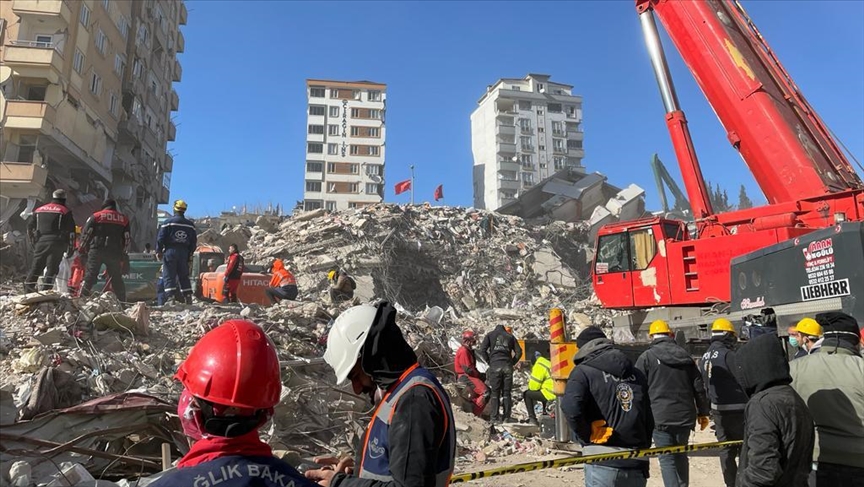
KAHRAMANMARAS, Türkiye
The seismic catastrophe that befell Türkiye last week appears to have triggered a change in its relations with Greece, as the waters that lay at the very heart of their disputes has now become channels of brotherhood by carrying rescue teams for quake survivors.
Greek volunteers are rushing to southern Türkiye to help search for any survivors trapped in mountains of debris, sailing through a sea which has been a persistent source of maritime tensions between Ankara and Athens.
A group of 35 Greek search and rescue personnel are busy in the southern Kahramanmaras province looking for earthquake survivors.
They reached Kahramanmaras on Saturday night after traveling around 30 hours from Athens.
“We used a boat from Mitilini port on the Lesbos (Midilli) island along with our emergency vehicles,” Kostas Tsakonas, one of 35 members of the Civil Protection volunteer group, told Anadolu while he was busy coordinating with other volunteers searching for survivors trapped in the wreckage.
The group has 11 women members, including a medical doctor.
“When we reached (Türkiye), the first message we received was: ‘Welcome brothers’,” he said.
The volunteer group has a sniffer dog, medicine, an ambulance, seven vehicles and a huge amount of equipment and tools for search and rescue to help find survivors. The group was facilitated by Turkish authorities to cross the sea from across Lesbos.
The waters between Türkiye and Greece often see tensions over maritime claims besides the pushback of migrants by Athens.
But the quake tragedy that struck Türkiye last week, causing at least 31,643 deaths, seems to have changed the weather of the bilateral relations.
Greek Foreign Minister Nikos Dendias on Sunday became the first top diplomat from any European country to pay a solidarity visit to Türkiye in the wake of the disaster brought by the earthquakes.
He visited the southern Hatay province, where he was received by Turkish Foreign Minister Mevlut Cavusoglu, who said Türkiye and Greece should not wait for another earthquake to mend the fences.
The Greek volunteer said the situation in Kahramanmaras province, the ground zero of the twin quakes, was “terrible,” which had left many of the team members “crying.”
Greeks are among over 9,400 international search and rescue personnel from 77 countries who have flown to Türkiye since last week to join the efforts to search for survivors.
‘Moved by strength of Turks’
A few 100 meters away, an Egypt-based Japanese journalist is in deep thoughts, looking at the widespread destruction caused by the earthquakes.
“I feel sorry for this tragedy,” said the journalist, who identified himself as Iyori.
He, however, stressed that the local people were “strong.”
“I am moved by the strength of the people here. Even when they are suffering, they are offering tea, food and other things,” he said, recalling the 2011 earthquake that had struck Japan, triggering a tsunami which destroyed the Fukushima nuclear power plant.
Citing Japan’s experience as one of the most seismically vulnerable countries, Iyori emphasized the need for taking proper measures with regards to construction and building laws.
“This is for our children … This is for our future generations,” he stressed.
Nearby a Chinese doctor and her colleague are standing as other volunteers from their group are searching for survivors.
After seeing this “serious earthquake,” the doctor told Anadolu via an interpreter: “We felt it as our responsibility to join the efforts to look for survivors.”
The doctor is part of a 16-member team affiliated with the Red Cross Society of China.
There are around 17 different teams from China working across quake-hit southern Türkiye.
Soup, tea, books amid heaps of rubble
As various search teams continue their relentless efforts to look for survivors, body bags of victims continue to be transported out of neighborhoods for final rites.
A member of the Kuwait Fire Force told Anadolu that around 45 of his colleagues flew to Türkiye soon after the earthquakes last week. They recovered a lot of bodies.
As Türkiye gradually moves out of the first phase of post-quake operations towards recovery, residents of this southern province of over half a million people are struggling with air heavily filled with dust and streets blocked with rubble as roadsides hum with dozens of volunteer groups serving victim families, relatives, friends, and search and rescue personnel with soup, food and tea.
Mounds of books have piled up along the pathways while researchers from Japan are briskly traversing the mountains of rubble, taking pictures of damaged buildings and later analyzing the situation.
Late in the evening, people are seen making beelines along the pathways where electricity is running to charge their mobile phones as the earthquakes temporarily disrupted telecommunication, water and electricity supplies in damaged areas.
The first 7.7 magnitude earthquake hit Kahramanmaras around 4:17 a.m. (0117GMT) on Feb. 6 and the second 7.6 magnitude earthquake followed nine hours later, causing widespread death and destruction in at least 10 southern provinces of the country.
More than 13 million people were affected across 10 provinces, including Hatay, Gaziantep, Adiyaman, Malatya, Adana, Diyarbakir, Kilis, Osmaniye, and Sanliurfa.
Thousands of people have been evacuated from quake-hit regions, while more than 238,500 search and rescue personnel are currently working in the field, according to the Turkish Disaster and Emergency Management Presidency (AFAD).
Nearly 155,400 tents have been set up for the survivors, AFAD said.
President Recep Tayyip Erdogan said last Friday that Türkiye is facing one of the biggest disasters in its modern history.
Condolences have poured in from around the world expressing solidarity with Türkiye, with many countries sending rescue teams and aid.
Anadolu Agency website contains only a portion of the news stories offered to subscribers in the AA News Broadcasting System (HAS), and in summarized form. Please contact us for subscription options.







